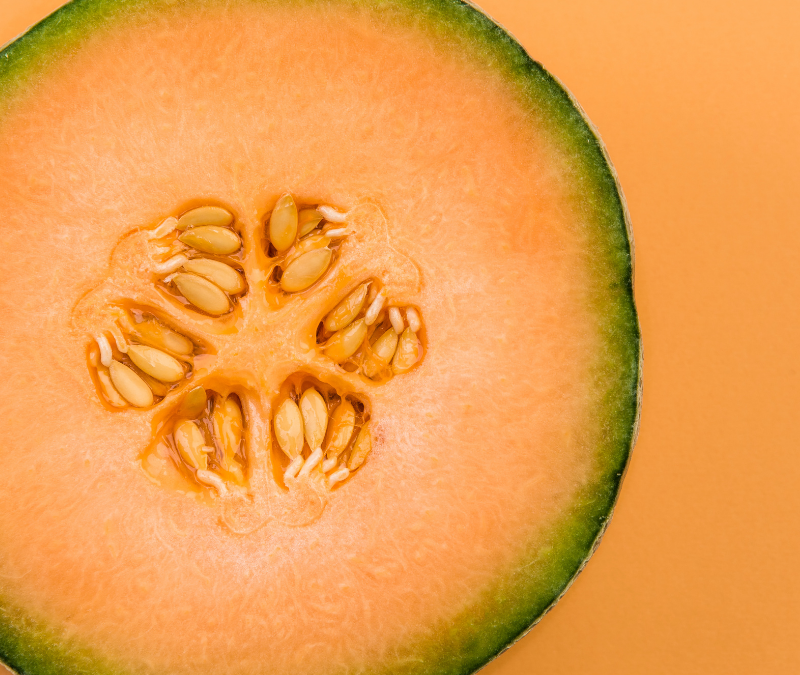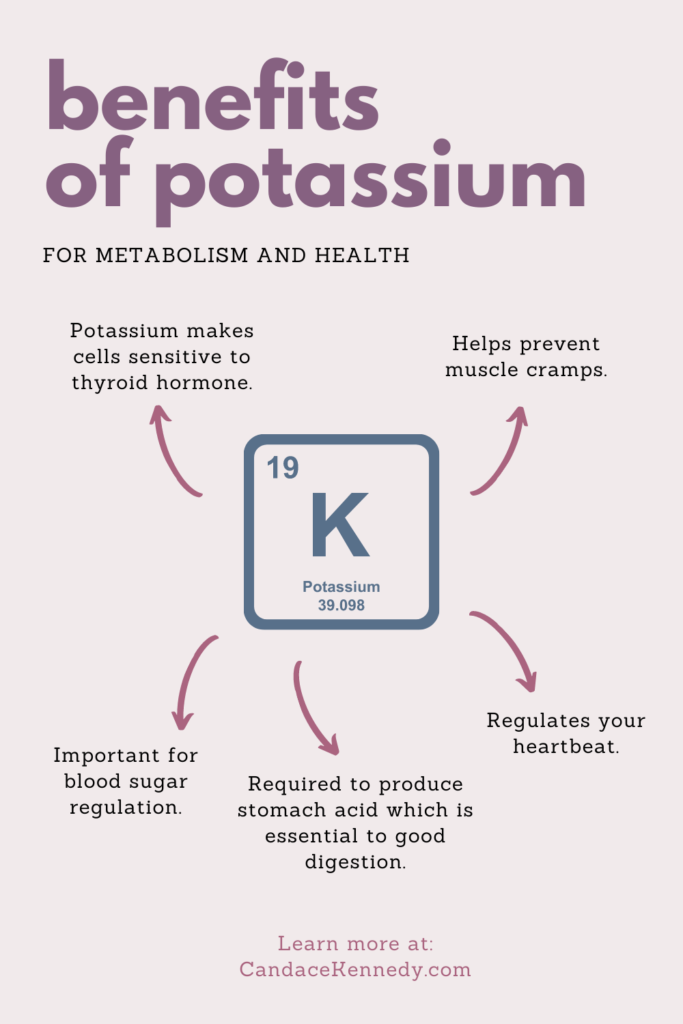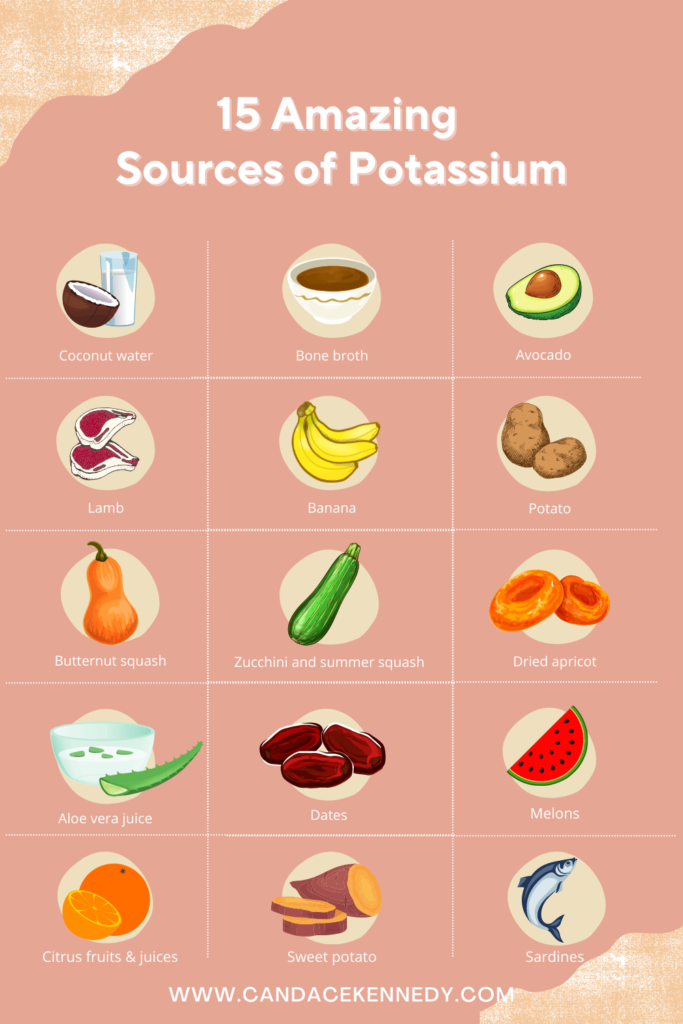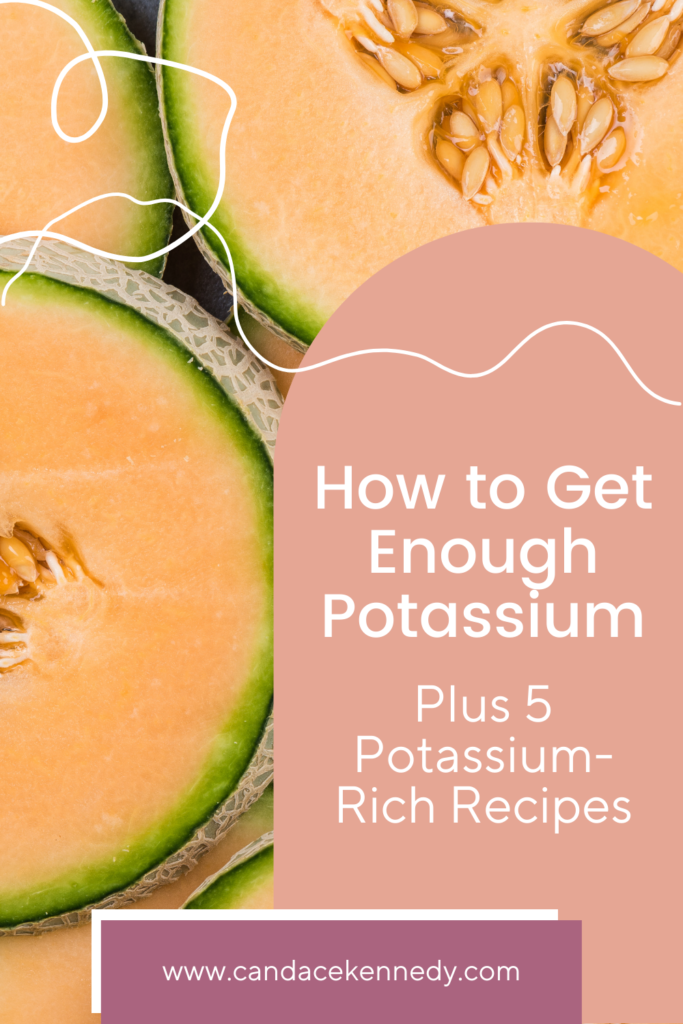This often underestimated mineral is key to just about every aspect of health. Potassium plays a role in so many bodily functions and it’s not that easy to get enough.
Potassium is one of the most underrated nutrients, in my opinion. I’ve seen many cases with my clients and in my own health that, after focusing on potassium levels and mineral balance, energy levels improve, thyroid labs improve, weight management gets easier, and so much more.
In this post, we will talk about the importance of potassium in the diet, some symptoms of potassium deficiency, and the best foods sources of potassium. Plus, a few potassium-rich recipes.
Role of potassium and potassium benefits:
Most people associate potassium with muscle cramps and heartbeat regulation. Yes, potassium is important for those, but did you know that it’s also essential to thyroid health? Potassium makes cells sensitive to thyroid hormone. Without enough potassium, the cells won’t take thyroid hormone in as efficiently. Since the thyroid affects the rate at which our cells burn glucose (our metabolic rate), potassium can have a big impact on metabolism.
Some other key functions of potassium:
- Potassium is essential to a well-functioning metabolism, thyroid, and digestion and also supports the adrenal glands.
- It is also required to produce stomach acid which is essential to good digestion.
- Not only that, but it’s about as important as insulin for blood sugar regulation.
- Inadequate potassium can lead to chronic health issues and symptoms.
Symptoms of potassium deficiency:
Getting enough of all of our minerals is so important. When we lack one or when they are out of balance, unpleasant symptoms can arise. Some symptoms of low potassium include:
- Low energy and fatigue
- Bloating and constipation
- Mood fluctuations
- Insulin resistance
- Muscle weakness and cramps
- Brain fog
- Irritability
- Abnormal psychological behavior, including confusion and depression
- Cellulite buildup
How to get enough potassium
Many people think eating a banana is all it takes to get a decent amount of potassium. But did you know that a medium banana only has about 8% of your daily potassium needs? It’s a good start, but getting enough of this mineral takes more intention than that.
Great food sources of potassium:
Thankfully, potassium shows up in some pretty tasty foods! These are some great sources:
- Coconut water
- Avocado
- Bone broth
- Lamb
- Bananas
- Potatoes
- Winter and summer squashes
- Dried apricots
- Aloe vera juice
- Dates
- Melons
- Citrus fruits and juices
- Sweet potato
If you find it still difficult to reach the recommended 2600-3400 mg as suggested by the National Academy of Sciences or 4700 mg of potassium set by US FDA (it’s not easy!), adding these in can be helpful:
- Cream of tartar (a 1/4 teaspoon in smoothies or bone broth)
- Jigsaw Adrenal Cocktail (code CKN10 for $10 off)
- Bumbleroot Drink Mix (code CKN10 for 10% off)
Should you supplement with potassium?
A food-first approach is key, when it comes to minerals. Foods in their whole form come with all the necessary co-factors that help your body put potassium to use and keep your other minerals in balance. Potassium in an isolated form can throw other mineral ratios off. It’s important to keep all of your macro-minerals in balance. These are sodium, potassium, calcium, and magnesium.
A food-based approach with sodium, potassium, and calcium is essential, while supplementing with magnesium (glycinate, malate, bicarbonate) can be beneficial.
Generally speaking, supplementing with potassium isn’t ideal. Just like too little potassium can be an issue, having too much can be problematic also, especially when potassium is out of balance relative to sodium, magnesium, and calcium.
Under specific circumstances, you might find benefits from small doses of potassium bicarbonate or potassium chloride. Before supplementing, it’s important to know where your minerals are at. A good tool for this is an HTMA (hair tissue mineral analysis). Another important note is that if you’re going to supplement with potassium, making sure you’re getting enough of the other three macrominerals is key.
Knowing your potassium status:
A blood test for potassium doesn’t give a clear picture on potassium status. Since potassium is an intracellular mineral (meaning it does its magic within the cell), knowing your serum (blood) potassium isn’t all that helpful. A Hair Tissue Mineral Analysis test (HTMA) can give you a better picture of potassium status.
Recipes:
Winter squashes, sweet potatoes and bone broth are three of my favorite ways to get potassium in my diet. There are so many healthy and delicious ways to prepare these foods, the options are endless!
The recipes below all have foods that are potassium-rich, making it that much easier for you to hit your daily target.
- Bone broth recipe
- Summer Squash and Leek Soup
- Maple Roasted Acorn Squash
- Whipped Butternut Squash with Carrots
- Baked Sweet Potato Fries with Lemon, Garlic Aioli
And don’t forget about the adrenal cocktail! This is an essential part of mineral balance and a great way to support your adrenals with potassium, sodium, and vitamin C. Plus, the adrenal cocktail is so tasty!
I work with a lot of clients with mineral imbalances to help optimize metabolism and balance hormones.
Questions? Message me or drop them below!
Xo,
Candace
Important Notes:
I am not a doctor, and I don’t claim to be one. I can’t prevent, treat, cure or diagnose illness or disease. The information presented on this website is not meant to replace a one-on-one relationship with a qualified health care professional and is not intended as medical advice, treatment or diagnosis. The purpose of this website is to share knowledge from my research and experience. I encourage you to make your own decisions regarding your health care based on your own research and relationship with your health care professional.
Some of the links on this page are affiliate links, which means I earn a small commission if you purchase through that link, at no additional cost to you. Thank you for supporting my work!



